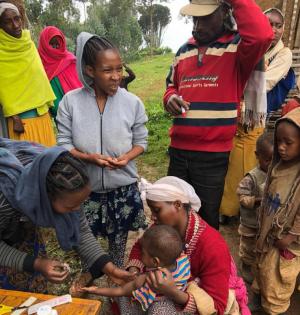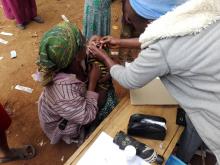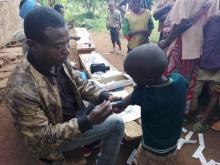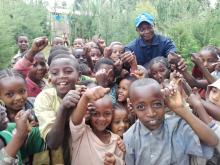Ethiopia launches an integrated measles, vitamin A, and deworming campaign for displaced people in Gedeo Zone
Addis Ababa, 7 August 2018 – The Ethiopian Ministry of Health has launched a preventive measles vaccination campaign to immunize 928 000 children aged 6 months to 15 years among the internally displaced and host communities in Gedeo Zone of the Southern Nations, Nationalities and Peoples Region. The campaign will also involve administering vitamin A to children aged six months to five years and deworming of children aged two to five years. Plans are underway for a similar campaign targeting 516 000 children in West Guji Zone of Oromia Region.
There are close to one million internally displaced persons (IDPs) in Gedeo and West Guji zones sheltering in schools, unfinished buildings, and tents. The make-shift camps are crowded with limited access to safe water, hygiene and sanitation, posing an increased risk for the spread of communicable diseases. Children and pregnant and breastfeeding mothers are at high risk of malnutrition.
“Conducting vaccination campaigns for the displaced and host communities is key to preventing an outbreak of infectious diseases such as measles. Malnutrition also needs to be addressed, which is why this campaign is integrated with vitamin A distribution and deworming for young children,” Dr Akpaka Kalu, WHO Representative in Ethiopia, said. “WHO teams are on the ground in Gedeo working with government staff for technical, operational and logistical support to the campaign and to the overall health emergency response.”
UNICEF is procuring 750 000 doses of the measles vaccine while the balance of 900 000 doses is being bought by the Ministry of Health.
“In an emergency of this nature, it is often the children who endure the greatest suffering,” said UNICEF Representative in Ethiopia Ms. Gillian Mellsop. “In these very difficult times for the children of Gedeo and West Guji zones, it is critical that we are present, together with the government and other humanitarian partners, to provide vaccination and other much-needed lifesaving support to children and women.”
With little access to food and safe water, children and women are facing a rapidly deteriorating nutrition situation. UNICEF has provided malnutrition treatment supplies, deployed trucks to ferry safe water in West Guji, and distributed soap, jerry cans, water tanks, and other non-food items. Technical experts are on the ground to support the immunization campaign, monitor the screening and treatment of children with malnutrition, and mitigate violence against women and children.
The World Health Organization is providing technical and operational support including micro-planning for the campaign, training of supervisors and facilitators, coordination, logistics, and monitoring and supervision of the quality of campaign.
As part of the response to the humanitarian crisis, WHO has deployed four international and more than 30 national public health experts to the affected zones to provide technical support on the ground. The organization has also donated medicines and medical supplies enough to provide emergency treatment to more than 200 000 people.
More than US$ 500,000 has been allocated from the United Nations Central Emergency Response Fund (CERF) to WHO and UNICEF towards supporting the preventive measles campaign led by the Ministry of Health of Ethiopia through its regional health bureaus in the Southern Nations, Nationalities and Peoples and Oromia regions. The campaign in Oromia Region is expected to commence on 10 August 2018.
===
Media contacts:
Loza Mesfin Tesfaye
Communications Officer
WHO Ethiopia
Telephone: +251 553 4777
Mobile: +251 911 144 194
Email: tesfayel [at] who.int (tesfayel[at]who[dot]int)
Victor Chinyama
Chief of Communication, Advocacy and Partnerships
UNICEF Ethiopia
Tel: +251 115 184 039
Fax: +251 115 511 628
Mobile: +251 911 255 109
Email: vchinyama [at] unicef.org (vchinyama[at]unicef[dot]org)






